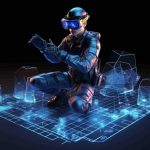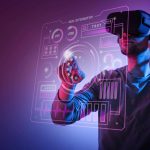
AI and HPC in Space Exploration: Simulating the Universe
Space is enormous and filled with endless mysteries. Researchers rely on cutting-edge tools to study it. Two key technologies are AI (Artificial Intelligence) and HPC (High-Performance Computing). In this article, you will learn how these tools simulate distant galaxies and support ambitious space missions.
Understanding the Power of AI and HPC in Space Exploration
AI and HPC in space exploration work together to handle massive volumes of data. First, AI helps interpret signals from telescopes and satellites. Next, HPC systems offer the speed required to process these signals at scale. Finally, this teamwork enables complex research that was not possible before.
Large-Scale Data Analysis
Space agencies collect data from orbiters, landers, and telescopes. AI algorithms sort through images and measurements. These algorithms can detect changes or patterns much faster than humans. This saves time and improves accuracy.
Predictive Modeling
AI models can predict cosmic events like solar flares or asteroid trajectories. This information helps mission planners prepare for possible threats. HPC clusters accelerate the process by running these models at high speed. That means results arrive quickly, supporting rapid decision-making.
Simulating the Universe with High-Performance Computing
HPC in space research allows scientists to simulate stars, galaxies, and dark matter. These simulations offer insights into how the universe evolves. They also help us refine theories about cosmic expansion.
Handling Enormous Data Sets
Cosmic data sets are huge. Each telescope survey can produce terabytes of information. HPC hardware, like supercomputers, can handle these tasks in parallel. This reduces processing time and boosts efficiency.
Accelerating Cosmic Research
Space exploration demands precise and complex calculations. HPC systems break down tasks into smaller pieces and solve them at once. This parallel process shortens research cycles and lets scientists test multiple theories. As a result, space agencies can plan new missions with greater confidence.
AI Algorithms for Space Missions
AI and HPC in space exploration go beyond data crunching. AI tools also support rovers and satellites. They allow autonomous decision-making when real-time human input is not possible.
Machine Learning for Planetary Analysis
Machine learning algorithms process surface images of planets and moons. They classify terrain types and identify new features. This can guide rover paths on Mars or help landers pick safe spots to touch down. Faster decisions make missions more efficient and reduce risks.
Deep Learning for Celestial Object Detection
Deep learning methods detect exoplanets and other distant objects. They look for small dips in a star’s brightness, which can signal a planet crossing in front of it. HPC platforms handle the large volumes of star data. This approach improves detection rates and speeds up discoveries.
Real-World Applications of AI and HPC
AI and HPC are not just buzzwords. They have clear, real-world benefits in space exploration. They support discoveries and protect missions from failures or delays.
Galaxy Simulations
Scientists use HPC resources to build models of galaxy clusters. These simulations reveal how galaxies merge and evolve over billions of years. AI refines these models by adjusting variables in real time. This helps researchers validate hypotheses about cosmic structures.
Weather Forecasting in Space
Accurate weather forecasts are vital for rocket launches and satellite operations. HPC can track changes in Earth’s upper atmosphere. AI then predicts conditions that might delay launches. Agencies can plan missions with fewer disruptions.
Challenges and Future Outlook
Despite their advantages, AI and HPC face certain obstacles. These include hardware limitations and the need for skilled professionals. However, the future looks bright for these technologies in space exploration.
Hardware Limitations
HPC systems demand significant power and cooling. Space missions must operate in harsh environments. Engineers work to develop smaller, more efficient hardware. This can help HPC systems run in orbit or on other planets.
Next-Generation Solutions
Quantum computing may one day surpass traditional HPC. AI techniques continue to evolve as well. Some research labs explore neuromorphic chips, which mimic human brain processes. These innovations could reduce power use and expand computing capabilities in space.
Conclusion
AI and HPC in space exploration are critical for simulating the universe and guiding missions. They allow us to analyze huge data sets, make predictions, and run complex simulations. Researchers gain deeper insights into cosmic evolution, planetary landscapes, and mission planning.
With further advancements, these tools will grow more powerful. They may soon run directly on spacecraft or deep-space probes. The future of space exploration depends on our ability to push computing boundaries. AI and HPC are key to unlocking that potential.
Frequently Asked Questions (FAQ)
1. What is HPC in space exploration?
HPC stands for High-Performance Computing. It refers to using supercomputers and clusters to process massive data quickly. In space exploration, it helps run advanced simulations and handle complex calculations.
2. How does AI help in space research?
AI helps sort, interpret, and analyze large sets of data. It uses algorithms like machine learning to detect patterns or changes. This makes mission planning more efficient and reduces the chance of errors.
3. Are HPC solutions only for large organizations?
Most HPC installations are found in research centers, space agencies, and big companies. However, smaller organizations can now access HPC through cloud platforms. This lowers the cost and makes HPC more widely available.
4. What are the main challenges of AI and HPC in space exploration?
The biggest challenges are hardware limits, power consumption, and extreme environment conditions. Skilled personnel and specialized equipment are also required. Despite these hurdles, ongoing research aims to make these systems more robust.
5. How do AI and HPC simulate the universe?
They run models that mimic cosmic processes like galaxy formation and star evolution. HPC provides the computing power, while AI refines the models by updating variables in real time. This combined approach offers deeper insights into how the universe changes over time.
Author Profile

- Online Media & PR Strategist
- Hello there! I'm Online Media & PR Strategist at NeticSpace | Passionate Journalist, Blogger, and SEO Specialist
Latest entries
 Scientific VisualizationApril 30, 2025Deepfake Scientific Data: AI-Generated Fraud in Research
Scientific VisualizationApril 30, 2025Deepfake Scientific Data: AI-Generated Fraud in Research Data AnalyticsApril 30, 2025What Is Data Mesh Architecture and Why It’s Trending
Data AnalyticsApril 30, 2025What Is Data Mesh Architecture and Why It’s Trending Rendering and VisualizationApril 30, 2025Metaverse Rendering Challenges and Opportunities
Rendering and VisualizationApril 30, 2025Metaverse Rendering Challenges and Opportunities MLOpsApril 30, 2025MLOps 2.0: The Future of Machine Learning Operations
MLOpsApril 30, 2025MLOps 2.0: The Future of Machine Learning Operations

